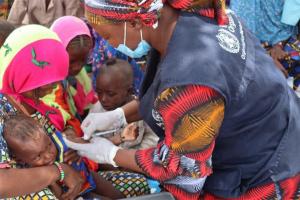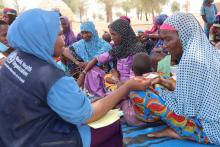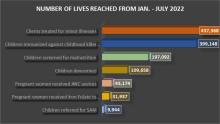WHO delivers critical health services to meet basic humanitarian needs of 1 million people
Yola, 30 September, 2022 - In line with the target of improving the health of billions of people by 2023, the World Health Organization (WHO) is supporting three states in northeast Nigeria – Borno, Adamawa and Yobe – (BAY states), to strengthen their health workforce to respond to the humanitarian crisis affecting the region through the provision of critical healthcare services including health risk messaging, and immunization.
In the BAY states, about 8.4 million people need humanitarian aid in 2022, women and children are the most vulnerable, exposed to gender-based violence and preventable disease outbreak.
In addition, thousands of people living in hard-to-reach areas do not have access to the urgently needed essential health services in the state.
So far in 2022 (January to June), WHO piloted various strategies to ensure millions of lives are saved by the provision of urgently needed health services, targeting the most vulnerable persons prone to disease outbreaks and those living in hard-to-reach locations with no access to health facilities.
Working with partners, WHO continues to deliver assistance, including delivery of healthcare services, and capacity building of over 1,400 healthcare workers and 300 health sector partners to provide quality health services and risk messages to the people.
The WHO's assistance in the BAY states focuses on strengthening disease surveillance systems, providing nutrition, protection for those facing gender-based violence, immunization services, and health care and have reached more than one million people across the region.
Other services provided are outbreak response, specialized mental health care/psychosocial support, response to emergency health services through the mobile-health teams in the hard-to-reach areas, seasonal malaria chemoprevention campaign, support to victims of gender-based violence, and capacity building for health personnel in member states.
Across the three states, WHO supported mobile health teams reached 399,148 children with live-saving vaccines against childhood killer diseases such as measles, polio and others, 109,658 dewormed, and 437,368 clients treated for minor illnesses.
Furthermore, 197,092 children were screened for malnutrition and 9,944 with Severe Acute malnutrition were referred to functional health facilities for further management, and 43,174 pregnant women received ANC services to prevent anaemia in pregnancy, with 31,937 pregnant women given iron folate/iron acid.
Commending the humanitarian support, Adamawa state commissioner of health and human services, Professor Abdullahi Isa, said WHO has been a reliable partner in the struggle to provide universal health coverage to the people in the northeast.
He said that WHO is committed to ensuring that no one is left behind in access to quality health services, especially the vulnerable, as it is crucial to saving millions of lives.
“The organization has been a trusted partner in interventions such as seasonal malaria chemoprevention, strengthening of the surveillance system, and capacity building for healthcare workers in the covid-19 response.
Support provided include facilitating the mobile health teams to reach the under-serve individuals living in hard-to-reach locations in the state with urgently needed health services”, said Professor Isa.
Buttressing the importance of interventions, the WHO northeast Emergency Manager, Dr Richard Lako, said WHO remains committed to leading and championing global efforts to give everyone, everywhere an equal chance to live a healthy life.
He said irrespective of the humanitarian crisis, people in the region deserve an equal chance to live healthy life.
“There is need to continue with the health response to mitigate the effect of the crisis in the region, to reduce mortality and morbidity rates by providing life-saving essential health services,” he said.
The interventions were possible thanks to support from the government of Germany, the United States Agency for International Development, the Nigerian Humanitarian Funds, Bill and Melinda Gates, Contingency Fund for Emergencies, European Union, European Civil Protection and Humanitarian Aid Operations, and the government of Canada.





